Related Research Articles

The Hunsrück is a long, triangular, pronounced upland in Rhineland-Palatinate, Germany. It is bounded by the valleys of the Moselle-Saar (north-to-west), the Nahe (south), and the Rhine (east). It is continued by the Taunus mountains, past the Rhine and by the Eifel past the Moselle. To the south of the Nahe is a lower, hilly country forming the near bulk of the Palatinate region and all of the, smaller, Saarland. Below its north-east corner is Koblenz.

Simmern is a town of roughly 7,600 inhabitants (2013) in Rhineland-Palatinate, Germany, the district seat of the Rhein-Hunsrück-Kreis, and the seat of the Verbandsgemeinde Simmern-Rheinböllen. In the Rhineland-Palatinate state development plan, it is set out as a middle centre.

Heppenheim (Bergstraße) is the seat of Bergstraße district in Hesse, Germany, lying on the Bergstraße on the edge of the Odenwald. It is best known for being the birthplace of Sebastian Vettel, a four-time Formula One World Champion and the place of founding of the Free Democratic Party (Germany).

Bad Schwalbach is the district seat of Rheingau-Taunus-Kreis, in Hesse, Germany.

Johannes Bückler was a German outlaw who orchestrated one of the most famous crime sprees in German history. He has been nicknamed Schinderhannes and Schinnerhannes in German and John the Scorcher, John the Flayer and the Robber of the Rhine in English. He was born at Miehlen, the son of Johann and Anna Maria Bückler. He began an apprenticeship to a tanner but turned to petty theft. At 16 he was arrested for stealing some of the skins, but he escaped detention. He then turned to break-ins and armed robbery on both sides of the Rhine, which was the border between France and the Holy Roman Empire.
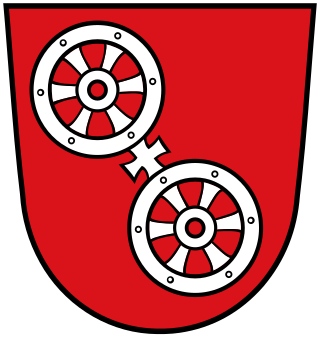
The Wheel of Mainz or Mainzer Rad, in German, was the coat of arms of the Archbishopric of Mainz and thus also of the Electorate of Mainz (Kurmainz), in Rhineland-Palatinate, Germany. It consists of a silver wheel with six spokes on a red background. The wheel can also be found in stonemasons' carvings and similar objects. Currently, the City of Mainz uses a double wheel connected by a silver cross.
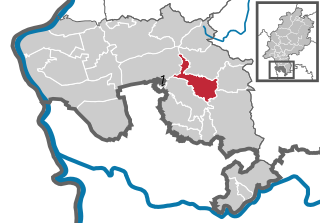
Rimbach (Ben-Stadt) in the Odenwald is a municipality in the Bergstraße district in southern Hesse, Germany.

Veldenz is an Ortsgemeinde – a municipality belonging to a Verbandsgemeinde, a kind of collective municipality – in the Bernkastel-Wittlich district in Rhineland-Palatinate, Germany. It is the former main seat of the County of Veldenz, once a prominent principality to which belonged 120 villages and towns now in Rhineland-Palatinate and northern Alsace and Lorraine.

Dörrebach is an Ortsgemeinde – a municipality belonging to a Verbandsgemeinde, a kind of collective municipality – in the Bad Kreuznach district in Rhineland-Palatinate, Germany. It belongs to the Verbandsgemeinde Langenlonsheim-Stromberg, whose seat is in Langenlonsheim.

Schneppenbach is an Ortsgemeinde – a municipality belonging to a Verbandsgemeinde, a kind of collective municipality – in the Bad Kreuznach district in Rhineland-Palatinate, Germany. It belongs to the Verbandsgemeinde Kirner Land, whose seat is in the town of Kirn.
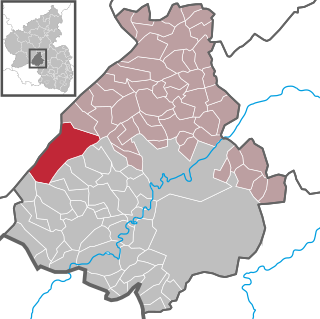
Allenbach is an Ortsgemeinde – a municipality belonging to a Verbandsgemeinde, a kind of collective municipality – in the Birkenfeld district in Rhineland-Palatinate, Germany. It belongs to the Verbandsgemeinde Herrstein-Rhaunen, whose seat is in Herrstein.
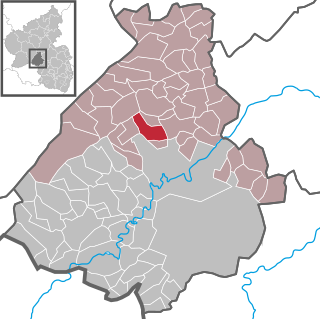
Veitsrodt is an Ortsgemeinde – a municipality belonging to a Verbandsgemeinde, a kind of collective municipality – in the Birkenfeld district in Rhineland-Palatinate, Germany. It belongs to the Verbandsgemeinde Herrstein-Rhaunen, whose seat is in Herrstein.

Langweiler is an Ortsgemeinde – a municipality belonging to a Verbandsgemeinde, a kind of collective municipality – in the Birkenfeld district in Rhineland-Palatinate, Germany. It belongs to the Verbandsgemeinde Herrstein-Rhaunen, whose seat is in Herrstein.

Liebshausen is an Ortsgemeinde – a municipality belonging to a Verbandsgemeinde', a kind of collective municipality – in the Rhein-Hunsrück-Kreis (district) in Rhineland-Palatinate, Germany. It belongs to the Verbandsgemeinde Simmern-Rheinböllen, whose seat is in Simmern.

Riesweiler is an Ortsgemeinde – a municipality belonging to a Verbandsgemeinde, a kind of collective municipality – in the Rhein-Hunsrück-Kreis (district) in Rhineland-Palatinate, Germany. It belongs to the Verbandsgemeinde Simmern-Rheinböllen, whose seat is in Simmern.
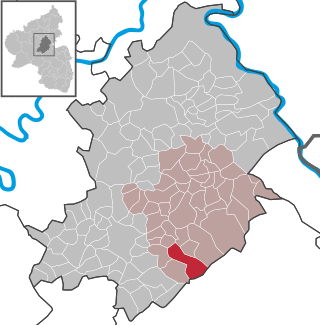
Sargenroth is an Ortsgemeinde – a municipality belonging to a Verbandsgemeinde, a kind of collective municipality – in the Rhein-Hunsrück-Kreis (district) in Rhineland-Palatinate, Germany. It belongs to the Verbandsgemeinde Simmern-Rheinböllen, whose seat is in Simmern.

The County of Sponheim was an independent territory in the Holy Roman Empire that lasted from the 11th century until the early 19th century. The name comes from the municipality of Sponheim, where the counts had their original residence.
Ludwig Becker was a German architect.
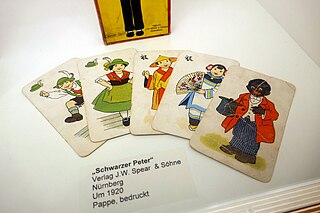
Black Peter is the English name of the European game of Schwarzer Peter which originated in Germany where, along with Quartett, it is one of the most common children's card games. Old Maid is similar in concept to Black Peter and may derive from it.
Peter Nikoll (1771–1817) was a bandit leader from Mecklenburg who was beheaded for his crimes. His nickname was Black Peter.